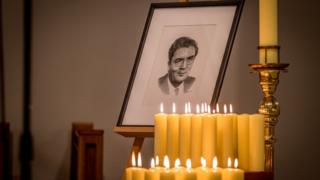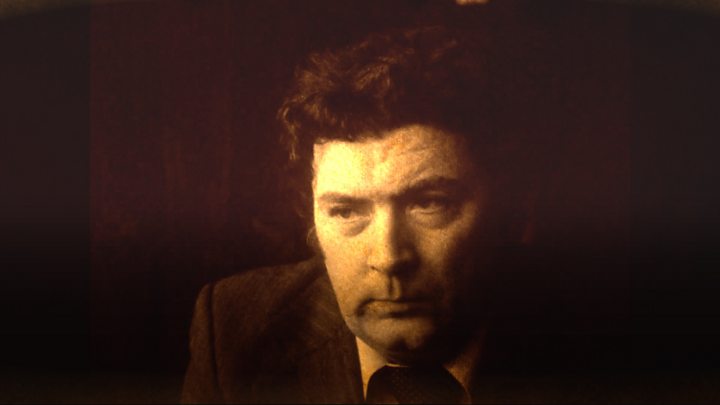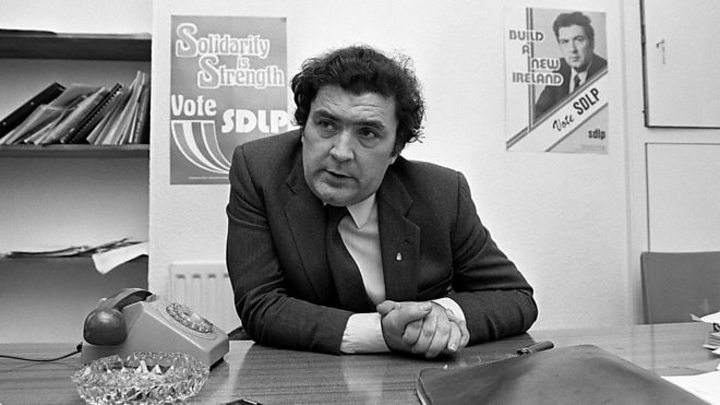 Image copyright
Stephen Lattimer
Image caption
A portrait of John Hume surrounded by candles lit by members of his family and colleagues
Image copyright
Stephen Lattimer
Image caption
A portrait of John Hume surrounded by candles lit by members of his family and colleagues
The funeral of John Hume, one of the key architects of the Northern Ireland peace process, is to take place in Londonderry on Wednesday.
The former SDLP leader died on Monday, aged 83, following a long illness.
His body was returned to his native city on Tuesday night, ahead of a funeral Mass at St Eugene's Cathedral.
Mr Hume's family urged mourners wishing to line the streets to respect Covid-19 guidelines on gatherings and light a "candle for peace" at home.
On Tuesday night, many followed that advice as tributes continued to pour in from presidents and prime ministers for the former SDLP leader.
Image copyright various Image caption People lit candles in memory of Mr Hume and placed them in their windowsPrime Minister Boris Johnson tweeted that a candle had been lit in Downing Street, saying it was a "symbol" of the peace that Mr Hume "was so instrumental in securing".
About 120 people - mostly close family and friends - are expected to attend the funeral service, which is due to start at 11:30 BST.
It will be streamed here on the BBC News NI website, while BBC Radio Ulster's Talkback programme will have live special coverage from 11:15.

Media playback is unsupported on your device
The Bishop of Derry, Donal McKeown, will preside at the Mass and say the final words.
The priest who is due to deliver the funeral homily has echoed the family's call for mourners to pay their respects from home, rather than take part in a mass gathering during the pandemic.
Fr Paul Farren said: "We live in extraordinary times and sadly all those people all over the island of Ireland and beyond cannot attend.
"We ask people at home to pray, to light a candle - we will have a celebration of light and our intention is for peace."
Derry streets quiet as final mark of respect
At the scene: Davy Wilson, BBC News NI
In times more ordinary, this would have been a final farewell to draw thousands to Derry's St Eugene's Cathedral.
An occasion to honour a statesman, to remember and to celebrate a peacemaker.
John Hume's mark is everywhere in his home city.
But, such is the respect bestowed on him in these parts, the streets around the cathedral are largely empty.
Pat Hume, so widely regarded as the great woman behind the great man, had respectfully asked people to stay at home.
Those who did come stood outside the cathedral grounds, solemn and in silence.
Where in other times you may have expected politicians, prime ministers and presidents, today about 100 mourners will pay their respects and say goodbye.
They come to remember the man who led the way to peace, and remained one of their own; a fierce, dogged advocate for Derry.
This is the place he loved so well, a place where now he will rest in peace.
One of the highest-profile politicians in Northern Ireland for more than 30 years, Mr Hume helped create the climate that brought an end to the Troubles.
He was a founding member of the Social Democratic and Labour Party (SDLP) in 1970 and led the party from 1979 until 2001.
Image copyright PAcemaker Image caption Mr Hume's wife and family watch as his coffin is taken to St Eugene's Cathedral in Derry on Tuesday eveningSince his death on Monday, tributes have been paid from across the world, reflecting his international reputation.
Former US President Bill Clinton remembered his persistence and unshakeable commitment to non-violence, while former UK Prime Minister Tony Blair, who was in office when the Good Friday Agreement was signed, described him as "a political titan".
Image copyright Pacemaker Image caption People have been signing a book of condolence for John Hume in Derry's GuildhallThe taoiseach (Irish PM) at the time of the deal, Bertie Ahern, recalled the former SDLP leader as a force for stability amid days of violence and chaos.

Media playback is unsupported on your device
On Monday, the Irish government lowered its flag to half mast outside its Dublin headquarters and also outside Iveagh House, which houses the Department of Foreign Affairs to "mark the passing of Nobel Peace Prize Laureate John Hume".
Books of condolence have been opened across Ireland for mourners to pay their respects and leave tributes to Mr Hume.
Image copyright PAcemaker Image caption People in Derry lit candles in memory of Mr Hume on Tuesday nightThe former Foyle MP and MEP for Northern Ireland, who had dementia and in recent years had lived in a care home in Londonderry, died in the early hours of Monday morning.
On Wednesday, the national flag will fly at half mast outside Leinster House in Dublin, which houses the Irish parliament.
You may also be interested in:
In their words: Former presidents and current prime ministers pay tribute to Mr Hume's illustrious career Fish, finance, football: The lesser-known John Hume Inspiring a generation: Young people explain what John Hume meant to them In pictures: The career of one Northern Ireland's foremost political leaders Analysis: The man who was able to unpick the lock of the Troubles Diplomats recall the late SDLP leader's special connection to the US In depth: Read BBC News NI's obituary of John HumeSpeaker of the Dáil, the Irish lower house, Seán Ó Fearghaíl TD, said he wished "to join with the many deep expressions of sympathy on the death of John Hume".
"He was a true public representative, steeped in the life, concerns and aspirations of the people of his beloved Derry," he said.
The Hume Foundation
Meanwhile, the BBC understands plans are well advanced for the creation of a John and Pat Hume Foundation.
Image copyright PAcemaker Image caption Members of the SDLP and other mourners lined the driveway of St Eugene's church with candles as his coffin arrived on Tuesday eveningThe aim of the foundation will be to protect the legacy of the former Nobel Peace Prize winner.
It will also assist those working for reconciliation and peaceful political change in Ireland and around the world.
It is understood the Hume Foundation had been due to launch in May, but the plan had to be abandoned as a result of the Covid-19 pandemic.
In the USA, where Mr Hume commanded immense respect, it is common for former presidents and other senior politicians to create institutes or libraries to continue their work after they leave office.

 5 years ago
668
5 years ago
668 

